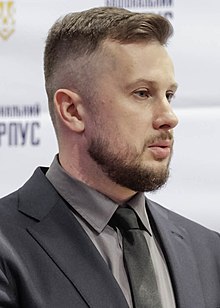Andrij Bilezkyj
Andrij Bilezkyj ( Ukrainian Андрій Євгенійович Білецький ; born August 5, 1979 in Kharkiv , Ukrainian SSR ) is a Ukrainian nationalist and right-wing extremist politician . Between 2014 and 2019 he was a member of the Verkhovna Rada .
Life
Bilezkyj was born in Kharkiv. In 1990, at the age of twelve, he refused to join the pioneer organization Vladimir Ilyich Lenin and hoisted the Ukrainian flag over his school building. After graduating from high school, he studied history at Kharkiv University . Since 2002 he has been a member of various militant nationalist organizations. He is considered to be the chairman or “leader” of the neo-Nazi organizations Social-National Assembly and Patriot of Ukraine .
On charges of attempted murder, Bilezkyj was detained from December 2011 to February 2014 without a conviction. He was released on February 24, 2014 under an amnesty decided by the Ukrainian parliament .
In spring 2014, Bilezkyj co-founded the voluntary combat unit, the Azov Battalion, now the Azov Regiment , which has been criticized for its sometimes openly right-wing extremist positions. Bilezkyj, however, denies that the symbolism used by the regiment is related to National Socialism. He acts as the unit's commander and took part in combat operations as part of the 2014 Ukraine crisis . On September 2, 2014, the Ukrainian President Petro Poroshenko awarded him the medal “For Bravery”. In September 2014, Bilezkyj was awarded the rank of lieutenant colonel in the Ukrainian Ministry of the Interior by Interior Minister Arsen Avakov .
In the 2014 parliamentary elections , Bilezkyj ran as a formally independent candidate in Kiev Obolon Raion and won a direct mandate for the Verkhovna Rada. His campaign was supported by both the Petro Poroshenko bloc and the Popular Front .
In October 2016, Bilezkyj was elected chairman of the far-right National Corpus party. After the parliamentary elections in 2019 , he lost his mandate.
Political positions

Political observers describe Bilezkyj as a neo-Nazi and a right-wing extremist. In August 2014, the British newspaper The Daily Telegraph claimed that Bilezkyj wrote in a commentary: “Our nation's historic mission at this critical moment is to lead the world's white races on a final crusade for their survival.” Bilezkyj himself denies, however to have made this statement.
Bilezkyj himself emphasizes that he is not an anti-Semite or a racist . In an interview he stated that he viewed Israel and Japan as role models for the future development of Ukraine.
Web links
Individual evidence
- ↑ A. Bereza: Andrij Bilezkyj: How the war made a political prisoner commander of the Azov battalion. . Novoye wremja, October 22, 2014
- ↑ A small regime change , article by Andreas Umland in Ukraine-Analyzes No. 142
- ^ Announcement about the amnesty on the website lucorg.com
- ↑ http://lb.ua/news/2014/12/10/288683_andrey_biletskiy_polovina_azova.html ( Memento from January 19, 2015 in the Internet Archive )
- ^ Website of the Ukrainian President from September 2, 2014
- ↑ Website np.pl.ua from September 18, 2014
- ^ How nepotism benefits Ukrainian neo-Nazis , article by Anton Shekovtsov in Die Zeit, December 11, 2014
- ^ Article in the Wiener Zeitung of October 24, 2014
- ^ Nationalist Azov Battalion starts political party . In: Kyiv Post , October 15, 2016.
- ↑ Ukraine has ignored the far right for too long - it must wake up to the danger . The Guardian, November 13, 2014.
- ↑ Tom Parfitt: Ukraine crisis: the neo-Nazi brigade fighting pro-Russian separatists. In: The Telegraph. August 11, 2014, accessed August 23, 2018 .
- ↑ Halya Coynash: Anti-Semitism is no vote-winner even for Ukraine's far-right. In: Kharkiv Human Rights Protection Group . October 2, 2015, accessed August 23, 2018 .
- ↑ Билецкий: Половина людей, которые воевали за Украину, разговаривает на русском языке. In: gordonua.com. November 20, 2018, Retrieved October 19, 2019 (Russian).
| personal data | |
|---|---|
| SURNAME | Bilezkyj, Andrij |
| ALTERNATIVE NAMES | Білецький, Андрій Євгенійович (Ukrainian); Bilezkyj, Andrij Evgenjewitsch |
| BRIEF DESCRIPTION | Ukrainian politician |
| DATE OF BIRTH | 5th August 1979 |
| PLACE OF BIRTH | Kharkiv |
